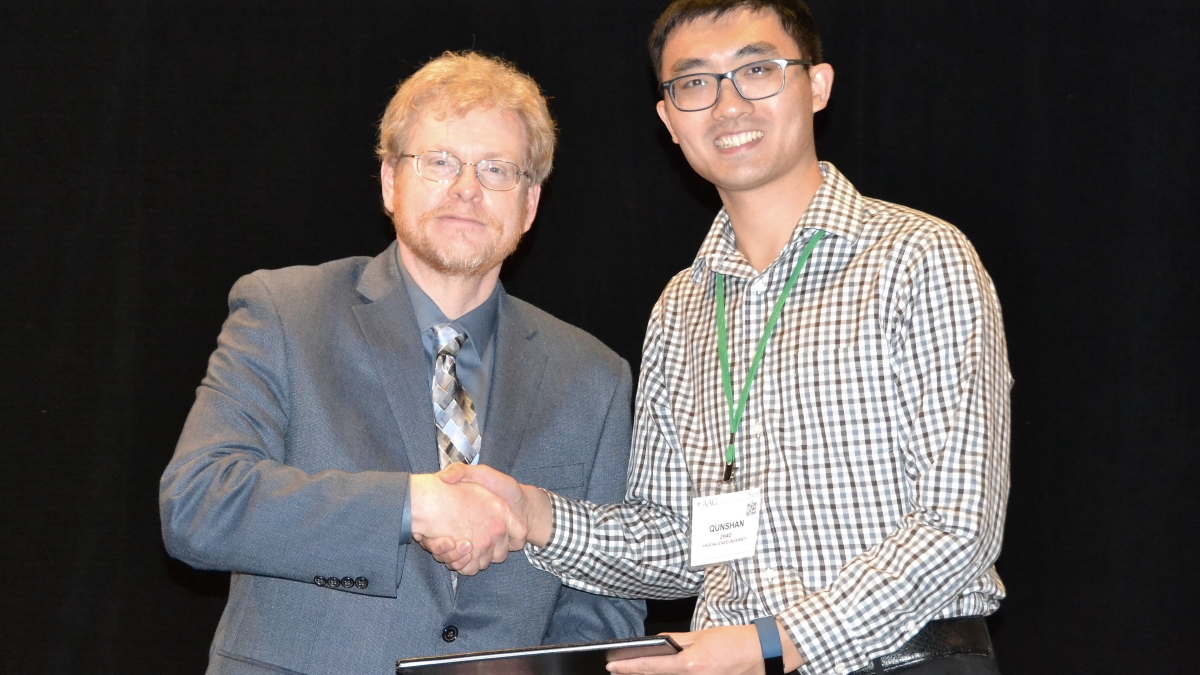ASU graduate selected for prestigious geography award

Quanshan Zhao accepts his award during the annual meeting of the American Association of Geographers.
Qunshan Zhao of Arizona State University and Bisola Falola of the University of Texas at Austin are the recipients of the 2018 J. Warren Nystrom Award, announced by the Nystrom Committee and the American Association of Geographers.
The annual prize for a paper based upon a recent dissertation in geography is supported by a fund established by former AAG President J. Warren Nystrom. The four finalists in this year’s competition presented their papers in a special session on April 11, after which the Nystrom Committee selected the two Nystrom Awardees.
Zhao’s dissertation is titled “Impact of tree locations and arrangements on outdoor microclimates and human thermal comfort in an urban residential environment.” His dissertation attempts to understand how to design tree locations and arrangements to improve the urban thermal environment in Phoenix.
"What really inspired me at the very beginning is the summer weather in Arizona!" Zhao said. "Every time I hide under tree shade, I survive. This makes me want to explore more of tree shade and urban green infrastructure in the desert city. My spatial optimization background also contributes to my dissertation. I try to treat this question as an optimization question and explore the location aspects of urban trees."
Zhao's success being named a winner of the Nystrom Award continues a great legacy of ASU-connected winners.
"It is my greatest honor during my short period of academic career," Zhao said. "Nystrom Award was established in 1980 for the most outstanding paper based on a recent dissertation within three-years period, and many prestigious scholars were the winner of Nystrom Award, including faculty in our school such as Dr. Stewart Fotheringham and Dr. Wei Li. Also, I am the second winner of Nystrom Award from ASU after 19 years (Dr. Donald A. Friend, 1999 winner). I am also very happy to represent the Chinese scholars to win this award — only three of them won this award before, including Kam-Biu Liu (1983), Wei Li (1999) and Xuwei Chen (2006)."
Zhao hopes his dissertation will help people think about tree placement.
"The most important thing is to inform people that they need to plant their trees in appropriate locations and arrangements around their individual houses, and understand the tree benefits for their houses and the entire neighborhood," Zhao said. "Take-home point are: Trees should avoid canopy overlap to maximize shading benefits, do not plant trees to block existing wind tunnels and avoid tree shade on rooftops for potential solar-panel installation."
More Environment and sustainability

Driving green desalination
Wilderness survival TV show hosts, pirates and water treatment researchers agree on one thing: Most natural water sources are not…

ASU preservation facility serves as test bed for rooftop heat mitigation
A roof coating that uses thermal energy storage materials from Arizona State University spinout EnKoat is halting the heat in…

ASU Carbon Summit displays sustainability leadership, collaboration and ... electric motorcycles
This month, a student-led initiative brought government officials, entrepreneurs and nongovernmental organizations under one roof…